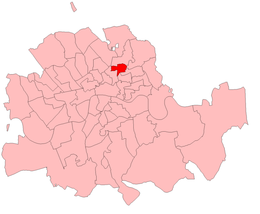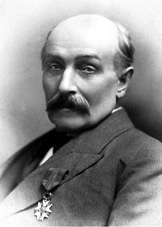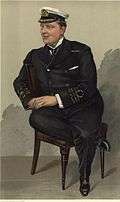1908 Haggerston by-election
The Haggerston by-election was a Parliamentary by-election. It returned one Member of Parliament to the House of Commons of the United Kingdom, elected by the first past the post voting system.
| |||||||||||||||||||||
| |||||||||||||||||||||
 | |||||||||||||||||||||
| |||||||||||||||||||||
Vacancy
Sir Randal Cremer the sitting member died on 22 July 1908. He had been Liberal MP for the seat of Haggerston since the 1900 general election.
Electoral history
The seat had been Liberal since they gained it in 1900. They easily held the seat at the last election, with an increased majority;

| Party | Candidate | Votes | % | ± | |
|---|---|---|---|---|---|
| Liberal | Randal Cremer | 2,772 | 53.9 | +3.6 | |
| Conservative | Rupert Guinness | 2,371 | 46.1 | -3.6 | |
| Majority | 401 | 7.8 | +7.2 | ||
| Turnout | 6,403 | 80.3 | +13.1 | ||
| Liberal hold | Swing | +3.6 | |||
No Labour Party or Socialist candidate had ever stood. At the 1907 London County Council election The Conservative backed Municipal Reform Party had gained Haggerston from the Liberal backed Progressive Party.
Candidates

- The local Liberal Association selected Walter Richard Warren to defend the seat. He was standing for parliament for the first time.
- The Conservatives retained 34-year-old Hon. Rupert Guinness as their candidate. He served as a captain in the Royal Naval Volunteer Reserve and was commanding officer of HMS President (London Division RNVR) from 1903. He was standing for parliament for the second time, having lost here in 1906. However, in 1907 he experienced electoral success in Haggerston when he was one of the two Municipal Reform candidates elected to serve on the London County Council
- The Socialist Social Democratic Federation chose to intervene in the by-election, and fielded Herbert Burrows a 63-year-old former civil servant from Suffolk, one of the organisers of the Matchgirls Strike. He was standing for parliament for the first time.
Campaign
Polling Day was fixed for 30 June 1908.
Result
The Conservatives gained the seat on a swing of 10.25%;
| Party | Candidate | Votes | % | ± | |
|---|---|---|---|---|---|
| Conservative | Rupert Guinness | 2,867 | 51.4 | -2.5 | |
| Liberal | Walter Richard Warren | 1,724 | 30.9 | -23.0 | |
| Social Democratic Federation | Herbert Burrows | 986 | 17.7 | n/a | |
| Majority | 1,143 | 20.5 | 28.3 | ||
| Turnout | |||||
| Conservative gain from Liberal | Swing | +10.25 | |||
The result was seen as a victory for Tariff Reform[3] and a disappointment to the third party Social Democratic Federation.[4]
Aftermath
Warren sought election to parliament at the next General Election at the Conservative seat of Wandsworth, without success. Guinness once again faced Burrows and a new Liberal candidate who defeated him;
| Party | Candidate | Votes | % | ± | |
|---|---|---|---|---|---|
| Liberal | Henry Chancellor | 3,041 | 48.0 | +17.1 | |
| Conservative | Rupert Guinness | 2,586 | 40.9 | -10.5 | |
| Social Democratic Federation | Herbert Burrows | 701 | 11.1 | -6.6 | |
| Majority | 455 | 7.1 | 27.6 | ||
| Turnout | |||||
| Liberal gain from Conservative | Swing | +13.8 | |||
Warren switched his attention to municipal politics and in March 1910, standing for the Liberal backed Progressive Party, he gained a seat from the Conservative backed Municipal Reform Party at Battersea in the 1910 London County Council election.
References
- British parliamentary election results 1885-1918
- British parliamentary election results 1885-1918
- http://nla.gov.au/nla.news-article90422285
- http://archive.spectator.co.uk/article/8th-august-1908/2/the-polling-in-the-haggerston-division-of-shoredit
- British parliamentary election results 1885-1918

